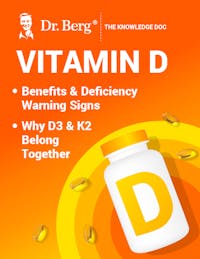Common Causes of Inflammation & Natural Remedies

Vitamin D – Benefits and Deficiency Warning Signs
Learn to recognize early signs of vitamin D deficiency
Discover how to maintain healthy vitamin D levels
Explore common factors that can contribute to vitamin D deficiency
Understand why vitamin D3 and K2 should always be taken together
Get practical advice on how to maximize the health benefits of vitamin D

Vitamin D – Benefits and Deficiency Warning Signs
Learn to recognize early signs of vitamin D deficiency
Discover how to maintain healthy vitamin D levels
Explore common factors that can contribute to vitamin D deficiency
Understand why vitamin D3 and K2 should always be taken together
Get practical advice on how to maximize the health benefits of vitamin D

Vitamin D – Benefits and Deficiency Warning Signs
Learn to recognize early signs of vitamin D deficiency
Discover how to maintain healthy vitamin D levels
Explore common factors that can contribute to vitamin D deficiency
Understand why vitamin D3 and K2 should always be taken together
Get practical advice on how to maximize the health benefits of vitamin D

Vitamin D – Benefits and Deficiency Warning Signs
Learn to recognize early signs of vitamin D deficiency
Discover how to maintain healthy vitamin D levels
Explore common factors that can contribute to vitamin D deficiency
Understand why vitamin D3 and K2 should always be taken together
Get practical advice on how to maximize the health benefits of vitamin D

Vitamin D – Benefits and Deficiency Warning Signs
Learn to recognize early signs of vitamin D deficiency
Discover how to maintain healthy vitamin D levels
Explore common factors that can contribute to vitamin D deficiency
Understand why vitamin D3 and K2 should always be taken together
Get practical advice on how to maximize the health benefits of vitamin D

Vitamin D – Benefits and Deficiency Warning Signs
Learn to recognize early signs of vitamin D deficiency
Discover how to maintain healthy vitamin D levels
Explore common factors that can contribute to vitamin D deficiency
Understand why vitamin D3 and K2 should always be taken together
Get practical advice on how to maximize the health benefits of vitamin D

Vitamin D – Benefits and Deficiency Warning Signs
Learn to recognize early signs of vitamin D deficiency
Discover how to maintain healthy vitamin D levels
Explore common factors that can contribute to vitamin D deficiency
Understand why vitamin D3 and K2 should always be taken together
Get practical advice on how to maximize the health benefits of vitamin D

Vitamin D – Benefits and Deficiency Warning Signs
Learn to recognize early signs of vitamin D deficiency
Discover how to maintain healthy vitamin D levels
Explore common factors that can contribute to vitamin D deficiency
Understand why vitamin D3 and K2 should always be taken together
Get practical advice on how to maximize the health benefits of vitamin D

Vitamin D – Benefits and Deficiency Warning Signs
Learn to recognize early signs of vitamin D deficiency
Discover how to maintain healthy vitamin D levels
Explore common factors that can contribute to vitamin D deficiency
Understand why vitamin D3 and K2 should always be taken together
Get practical advice on how to maximize the health benefits of vitamin D

Vitamin D – Benefits and Deficiency Warning Signs
Learn to recognize early signs of vitamin D deficiency
Discover how to maintain healthy vitamin D levels
Explore common factors that can contribute to vitamin D deficiency
Understand why vitamin D3 and K2 should always be taken together
Get practical advice on how to maximize the health benefits of vitamin D

Vitamin D – Benefits and Deficiency Warning Signs
Learn to recognize early signs of vitamin D deficiency
Discover how to maintain healthy vitamin D levels
Explore common factors that can contribute to vitamin D deficiency
Understand why vitamin D3 and K2 should always be taken together
Get practical advice on how to maximize the health benefits of vitamin D

Vitamin D – Benefits and Deficiency Warning Signs
Learn to recognize early signs of vitamin D deficiency
Discover how to maintain healthy vitamin D levels
Explore common factors that can contribute to vitamin D deficiency
Understand why vitamin D3 and K2 should always be taken together
Get practical advice on how to maximize the health benefits of vitamin D

Vitamin D – Benefits and Deficiency Warning Signs
Learn to recognize early signs of vitamin D deficiency
Discover how to maintain healthy vitamin D levels
Explore common factors that can contribute to vitamin D deficiency
Understand why vitamin D3 and K2 should always be taken together
Get practical advice on how to maximize the health benefits of vitamin D

Vitamin D – Benefits and Deficiency Warning Signs
Learn to recognize early signs of vitamin D deficiency
Discover how to maintain healthy vitamin D levels
Explore common factors that can contribute to vitamin D deficiency
Understand why vitamin D3 and K2 should always be taken together
Get practical advice on how to maximize the health benefits of vitamin D
Ever felt that lingering ache in your joints, the fiery burn of an old injury, or perhaps a stubborn headache that just won't quit? That's inflammation talking to you.
Learn about the most common causes of inflammation and what steps you can take to support your body in the face of this health problem.
Understanding Inflammation and Its Causes
Inflammation is the body's natural response to protect itself from harm. It plays a critical role in healing injuries and fighting infections but can also lead to serious health issues when out of control.

The Role of Inflammation in Autoimmune Diseases
Rheumatoid arthritis, lupus, and Crohn’s disease are examples of autoimmune diseases where inflammation runs amok.
The immune system mistakenly attacks healthy cells, leading to chronic inflammation. So, while you might think your body is helping you, it could be causing more damage than good.
The Link Between Gut Health and Inflammation
Your gut has a more significant say in your overall health than you may realize. Food allergies, inflammatory foods, or constipation can upset the delicate balance of bacteria there, triggering gut inflammation.
Nutritional Factors Contributing to Inflammation
It's not just about what we eat but how our bodies react. Certain foods can trigger inflammation, leading to discomfort and health complications.
Allergies as Triggers for Inflammation
You might be surprised at the link between allergies and inflammation. Food intolerances, like gluten or dairy sensitivities, can set off an inflammatory response in the body. Even environmental allergens like pollen can do the same.
Vitamin D Deficiency and Increased Inflammation
We need sunlight. It gives us vitamin D, which is crucial for bone health. A deficiency in this vitamin could increase inflammation.
The Role of Fatty Acids in Inflammation
Fats aren't all bad, but some are better than others when fighting inflammation. Achieving an equilibrium between omega-6 (typically present in veggie oils) and omega-3 (obtainable from fish) is essential.
Too much omega-6 can increase inflammation, so choose your fats wisely.
Frequent Eating, High Iron Levels, and Inflammation
Eating often might seem like a good idea if you're hungry all the time, but regular eating may also ramp up inflammatory processes within your body. On top of that, high iron levels can do the same. Consider spacing out your meals and checking on those iron levels.
Environmental Factors and Inflammation
We live in a world filled with toxins that can trigger inflammation. While we often think of diet or stress as the primary culprits, our environment plays an equally important role.
The Impact of Plastics on Inflammation
Plastics are everywhere, from water bottles to food packaging. But did you know they could be silently inflaming your body?
A recent Environmental Research study showed how contact with Bisphenol A (BPA), a common plastic element, can cause persistent inflammation.
BPA mimics estrogen, messing up hormone balance and sparking inflammatory responses. The bad news doesn't stop there; BPA also harms gut health by altering microbiome composition, further stoking inflammation.
It's no small task considering how pervasive plastics are, but it’s one worth undertaking if we wish for long-term health. To cut down on plastic exposure:
Avoid bottled water; opt for glass or stainless steel containers instead.
Skip canned foods, as most cans are lined with BPA-containing resin.
Ditch microwaveable meals packed in plastic trays.
Natural Remedies for Inflammation
Nature has endowed us with many options to combat inflammation without needing medications. Here are some possible remedies.
Turmeric and Ginger
Thanks to its active ingredient, curcumin, turmeric is known for its powerful anti-inflammatory properties. Similarly, ginger also helps reduce inflammation due to the presence of gingerols.

Omega-3 Fatty Acids
Omega-3 fatty acids found in fish like salmon or supplements can combat inflammation effectively. Research shows a diet rich in omega-3s may reduce inflammatory markers significantly.
Fruits and Vegetables High in Antioxidants
Fruits and vegetables high in antioxidants, such as berries, oranges, bell peppers, and leafy greens, can help reduce inflammation due to their antioxidant content. So make sure these foods find their way onto your plate regularly.
Green Tea
A steaming cup of green tea warms the soul and aids our bodies' battle against chronic diseases caused by inflammation.
This is all thanks to epigallocatechin gallate (EGCG), an abundant antioxidant in green tea renowned for fighting body-wide inflation. Studies confirm this effect, too.
While natural remedies offer significant benefits, they don't replace medical advice. Always consult healthcare professionals when making substantial changes to your diet or health routine.
Inflammation and Sore Gums
Inflammation can contribute to various oral health issues, including sore gums. While vitamin deficiency, particularly in vitamins like vitamin C, can be a factor in gum discomfort, inflammation is a common cause of sore gums.
The gums can appear red, swollen, and bleed when inflamed. Proper oral hygiene, a balanced diet rich in essential nutrients, and regular dental check-ups can help manage inflammation and maintain gum health.
If you suspect sore gums are related to a vitamin deficiency, it's essential to address this nutritional imbalance through dietary changes or supplements under the guidance of a healthcare professional.
Combining a diet high in vitamins and antioxidants with good oral hygiene practices can proactively combat inflammation and vitamin deficiency-related gum issues.
From Roots to Relief
Delves into the often-overlooked factors contributing to inflammation and explores effective natural remedies.
By understanding common causes of inflammation, such as poor diet and lifestyle choices, individuals can seek out solutions that address these issues at their source.
Among these solutions, the benefits of TUDCA—known for its potential to support liver health and reduce inflammation—stand out as a promising natural remedy.
Combining TUDCA with other holistic approaches offers a comprehensive path to alleviating inflammation and enhancing overall wellness, guiding you toward a healthier, more balanced life.
Conclusion
Inflammation can be like a persistent ache or a fiery burn, signaling trouble in the body. Understanding its origins, from autoimmune conditions to environmental factors like plastics, is crucial.
While natural remedies like turmeric and omega-3 fatty acids offer hope, consulting healthcare professionals before making significant changes is wise.
With knowledge and proactive steps, you can tackle inflammation, reclaiming your well-being and vitality.
Previous blog
The Absolutely BEST Way to Get Rid Love HandlesNext blog
9 Prescription Meds that Could Kill YouTags

Popular
08/21/2024
47.4K views
05/22/2024
41.5K views
11/18/2024
246.1K views
03/18/2024
11/21/2022




